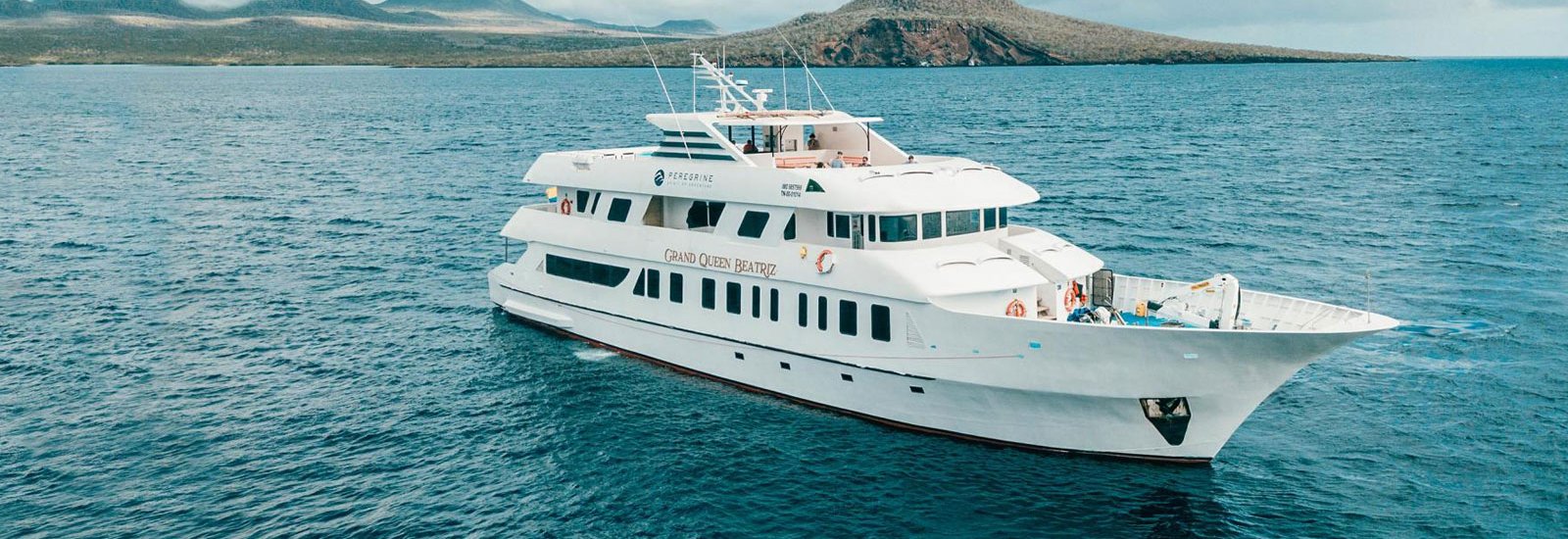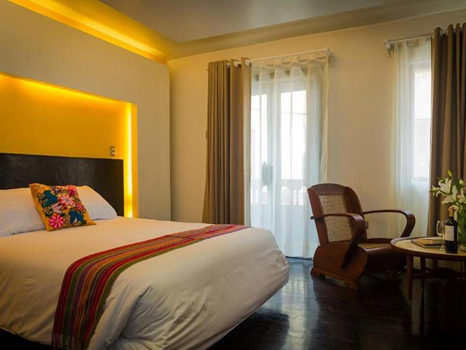Classic Galapagos: Central Southern Islands | Grand Queen Beatriz
10 Days
From USD 8,425
STYLE: Small Ship Expedition Cruise
Trip Code: ECINSCT
DIFFICULTY RATING: 2 (light adventure)
Start: Quito, Ecuador
Finish: Quito, Ecuador
SHIP: Grand Queen Beatriz
 Destination
Destination
Galapagos Islands, Ecuador, South America
 Departure Date
Departure Date
Selected Tuesdays
 Meals
Meals
Breakfast at the hotel and all meals, water, tea & coffee while onboard your cruise
 Transport
Transport
Group transfers throughout the itinerary
 Accommodation
Accommodation
Cabin on board ship & hotel
Enquire Now


 Included Sightseeing
Included Sightseeing
Daily excursions, panga rides, shore landings and expert briefings while onboard
* Itinerary is subject to change depending on weather conditions and government regulations.
OVERVIEW
Discover the very best of the Galapagos on this incredible 10 day adventure. Starting with a night in the vibrant and colonial town of Quito, you will be awash with a vibrancy of unique Ecuadorian history, stunning Andean mountain backdrops and incredible local experiences. Once in the Galapagos you will explore the beauty of this stunning archipelago. This largely untouched paradise is an amalgam of incredible landscapes - from sandy beaches, to rocky coves and volcano-carved sea tunnels. Not only are there incredible landscapes, but a plethora of curious wildlife including marine iguanas, sea lions, white-tipped reef sharks, rays, blue-footed boobies, Galapagos penguins and the legendary Galapagos tortoise.
Check out some of the other cruise itinearies on the Grand Queen Beatriz: 6 Day Southern Islands, 7 Day Southern Islands, 6 Day Central Islands, 10 Day Central Eastern Islands, 10 Day Southern Islands
ITINERARY

On arrival at Quito's Mariscal Sucre International Airport, you will be met and transferred to your hotel. The remainder of the day will be at your leisure.
A welcome meeting will be held in the evening at either 5 pm or 6 pm when you meet others travelling with you on your sail around the Galapagos Islands. As today is an arrival day, you can arrive at any time as there are no activities planned until the welcome meeting.
Quito sits at high altitude under the towering Pichincha volcano. It is a beautiful city, arguably one of the most beautiful in South America. The city stretches along the valley and is surrounded by the Andes. The Old Town of Quito is awash with history, with more than 30 churches to explore, and a number of fascinating museums. La Compania de Jesus is considered to be the most beautiful and ornate churches in the Americas. The city's oldest street, Calle La Ronda, is well worth exploring.
As this trip spends very little time in Quito, we recommend you spend a few extra days before or after your trip to experience all the city has to offer. You may even wish to explore further beyond the city and visit Otavalo, Cotopaxi, the Cloud Forest or the Equatorial Monument.

This morning you will be transferred to the airport for your flight to the Galapagos Islands. Please note the pick-up time can be as early as 4.30 am (a boxed breakfast will be provided), as the airport is a 1-hour drive away and you must allow for delays and check-in times. (Your tour leader will confirm this time with you at the welcome meeting).
The flight to the Galapagos will make one stop in Guayaquil to pick up other passengers. (Total flight time is about 3.5 hours).
On arrival in the Galapagos, you will be met in the arrival hall of the airport by a transfer guide and will head to your vessel – M/Y Queen Beatriz, anchored on the other side of Isla Santa Cruz. Our guide will accompany you on an airport bus to where you board a public ferry for a short journey across the Itabaca Channel. Once you reach Santa Cruz Island, board a private vehicle for a 45-minute drive to Puerto Ayora, the main port of the island. Here, there will be two dinghies to transport you and your fellow travellers to the boat. Once on board, cabins will be assigned and you get to meet our crew members and get to know your naturalist guide while enjoying a delicious lunch.
The small town of Puerto Ayora is the economic centre of the archipelago, and home to the Charles Darwin Research Station. You’ll take a visit after lunch on board the boat. As well as undertaking vital conservation work, the station also makes for interesting exploration and offers an opportunity to see giant tortoises. You will also be able to observe baby tortoises and land iguanas.
Please note the Transit Card & National Park Fees are not included in the cost of the trip as they need to be paid locally: There is a US$20 Galapagos Islands transit card fee that needs to be paid at the airport in Quito prior to departure to the islands.
All visitors must pay the Galapagos National Park fee of US $200 upon arrival at the airport in the Galapagos. If your trip visits Isla Isabela, there is also port fee of US$10 which is to be paid locally. These fees are to be paid in cash.

Today, take a morning excursion to North Seymour: one of the most visited islands in the Galapagos. The hiking trail on North Seymour crosses inland through the island and then explores the rocky coast. Along the way the trail passes colonies of blue footed boobies and frigate birds.
The magnificent frigate bird, a large black bird with a long wingspan and a hooked beak, is extremely fast and has excellent vision. Frigate birds are known for the large red pouch on their necks. During mating season, the males throw back their heads, inflate the pouch (sometimes to the size of a soccer ball), and shake trying to capture the attention of female frigates. Boobies and frigates have an interesting relationship. Sharing the same nesting area on North Seymour, blue-footed boobies nest on the ground making their nests from the twigs of the palo santos trees, while the frigate birds nests just above them in the saltbushes.
Your walk is followed by a spot of snorkelling, where you can find a colourful variety of fish and, possibly, some white-tipped reef sharks, rays and sea lions.
After lunch, visit the small sandy Isla Mosquera: a picturesque island located between Baltra and North Seymour. Along the rocks and in the tide pool, Sally Lightfoot crabs (red lava crabs) scamper back and forth, skipping across small pools of water in search of food. These crabs with their bright red shell tops and blue under shells are stunning against the black lava. The island also has a very large colony of sea lions, as well as a sizeable resident brown pelican population. Depending on the tides and visibility, you may have a chance to go snorkelling in its surrounding turquoise waters.

Take a panga (Zodiac boat) to Caleta Tortuga Negra (Black Turtle Cove) – a red mangrove wetland on the north shore of Isla Santa Cruz. You will paddle among the cove’s peaceful waters for your first taste of the underwater riches of this region – it’s a wonderful place to see green turtles, and is a nursery for golden cow-nose rays, eagle rays and Galapagos sharks. There is also abundant birdlife, such as the yellow warbler and lava heron. This is also a breeding area for turtles, so it is not uncommon to see them mating.
In the afternoon, cruise over for a walk on Cerro Dragón (Dragon Hill): one of the best places to see land iguanas in the islands. From our dry landing, walk to a brackish lagoon spotting lagoon birds such as stilts, pintail ducks, sandpipers, sanderlings and flamingos. Further inland, the trail offers a beautiful view of the bay and the western area of the archipelago. This area is a nesting site for land iguanas, which is constantly monitored and assisted by the Charles Darwin Research Station. The arid-zone vegetation makes for an ideal place to see Darwin's finches, Galapagos mockingbirds, the endemic Galapagos flycatcher and yellow warblers. The path can be challenging but it will be worth it for a spectacular view of the bay.
Estimated travel time/distance:
Caleta Tortuga Negra to Cerro Dragon: 2 hours (12 nautical miles)
Cerro Dragon to Sombrero Chino (Chinese hat): 1.5 hours (9 nautical miles)

Head towards Sombrero Chino: a small islet located near the south-east coast of Santiago. The island is shaped like a Chinese hat (Sombrero Chino) when seen from afar, and is geologically fascinating, with many lava tubes leading from the cone to the coast. You’ll approach Sombrero Chino via a beautiful crescent-shaped, sandy beach that is home to sea lions and Sally Lightfoot crabs. Opposite Sombrero Chino, on the rocky shoreline of nearby Santiago, you might see some Galapagos penguins. Follow a trail that circles the cove and passes through colonies of sea lions and marine iguanas. The cove also offers some great snorkelling opportunities, hopefully with penguins and sharks.
Next stop, the striking Isla Rabida – a tiny island sitting roughly 5 kilometres south of Santiago. Introduced species were eradicated in 1971, meaning that the native wildlife has now been returned to a state of isolation. Additionally, volcanic activity here has produced vivid colours, not least the red sand beaches and scarlet cliffs.
From the shore, the trail leads through to what is one of the finest lagoons in the Galapagos for flamingo spotting. Rabida is also a wonderful place to spot nesting pelicans, pintail ducks, marine iguanas and sea lions. There is an opportunity for snorkelling in a cove full of sea stars, damsels, gobies and surgeon fish.
Estimated travel time/distance:
Sombrero Chino to Isla Rabida: 1 hour (7 nautical miles)
Isla Rabida to Bachas Beach: 1 hour (7 nautical miles)

Today, take an early morning excursion to Las Bachas, which was so named after the barges abandoned by the American Navy here in the 1940s. The sandy beaches of Las Bachas on the north shore of Santa Cruz are a nesting site for the Pacific green turtle, and home to marine iguanas. The sand here is particularly white and soft as it is made of decomposed coral. The rocks provide great snorkelling and are the perfect habitat for the Sally Lightfoot crabs, which are plentiful on the island. A saltwater lagoon near to the beach is home to flamingo and whimbrel and great blue herons, so keep a look out.
In the afternoon, visit Punta Carrion, located in north-eastern Santa Cruz. This is a shallow and protected cove, ideal for snorkelling. Wildlife is plentiful, so look around for blue-footed boobies, Galapagos herons and great blue herons, and underwater, swim among rays and white-tipped reef sharks.

Wake up on the south Coast of Isla Isabela, the largest island of the Galapagos archipelago. Isabela was formed by five giant volcanic craters, all of which are still considered active. The island is located in one of the youngest geological areas in the world, having been formed less than 1 million years ago.
This southern coast of Isabela’s turquoise blue waters has the largest area of beaches in the Galapagos. You will visit Las Tintoreras, where from the viewing walkway you can look down into this narrow channel to see a colony of white-tipped reef sharks swimming and sleeping, and the occasional playful sea lion among them! Blue-footed boobies and penguins, marine iguanas and crabs also make their home here.
Enjoy a long walk on a gravel path through aa (‘ah-ah’) lava flow and see plenty of marine iguanas. Locally, the white sharks are known as 'tintoreras', hence the name of this spectacular site.
In the afternoon, take a leisurely walk through a coastal lagoon, where you might see some flamingos. This mangrove-lined path leads to Isabela’s Giant Tortoise Breeding Center (Arnoldo Tupiza) where you'll observe giant tortoises in all stages of development. Here you can see the five sub species of tortoises from Isabela, some of which are bred in captivity.
You will then have the choice of optional swimming at the beach or heading out for some shopping in Puerto Villamil.

Isla Floreana is a highlight of any Galapagos cruise, rich in natural wonders and wildlife. Enjoy a panga ride around the bay to saee marine iguanas, sea lions and crabs before taking a leisurely walk to Post Office Bay, where 18th century whalers used a barrel as an unofficial mail drop. This custom continues to this day with visitors to the Galapagos – post one of your own, or see if there are any you could deliver back home! You will also have the chance to go snorkelling with sea turtles.
Today is also one of your finest opportunities to see pink flamingos and other water birds wading in the lagoons, including pintails and stilts. Just offshore, the Devil’s Crown is an old eroded volcanic cone and a popular roosting site for seabirds such as boobies, pelicans and frigates. Red-billed tropicbirds can also be seen nesting in the rocky crevices. The centre of the cone is an outstanding snorkelling spot, perhaps the most remarkable in the entire archipelago, full of sea lions and colourful fish.
You will also go ashore at Punta Cormorant, where the sand is made up of fine olivine crystals (a glassy volcanic mineral), giving the beach an olive-green colour. It is a great place to see Galapagos sea lions.

Flights to mainland Ecuador from the Galapagos Islands depart mid-morning, so an early start is necessary to make the most of today’s visit to the small town of Puerto Ayora is the economic centre of the archipelago, and home to the Charles Darwin Research Station. As well as undertaking vital conservation work, the station also makes for interesting exploration and offers the best opportunities for close encounters with giant tortoises. You may also see baby tortoises and land iguanas.
This will be your final excursion before you head to the airport.
Upon arrival at Mariscal Sucre International Airport, enjoy an included transfer to your hotel. Choose whether to join your fellow travellers for an optional dinner this evening.

Your Galapagos adventure will come to an end today after breakfast. There are no activities planned for the final day so you are able to depart the accommodation at any time. There are many fascinating things to do in and around Quito, so please speak to our customer service representative about any optional activities that might be of interest. They can also assist you in booking a departure transfer to the airport.
WHY CHOOSE THIS CRUISE?
-
This voyage offers a night pre and post cruise in Quito - allowing you to experience the quaint colonial capital before exploring the magnificent Galapagos islands.
-
On Bachas Beach you will be able to see the remnants of barges left by the American Navy in the 1940's.
-
This voyage will be undertaken on the Grand Queen Beatriz - This custom-built yacht is perfect for sailing the Galapagos waters in style and comfort

Grand Queen Beatriz
Custom built, with a stylish modern design, ensuite bathrooms, outward-facing windows in all cabins and a jacuzzi on the sundeck, the ‘Grand Queen Beatriz’ is a modern and comfortable expedition ship operating in the Galapagos. Built to take just 16 guests it ensures an intimate and warm experience for those wanting to explore the magnificent islands of the Galapagos. You will travel with an English speaking National Park guide who will help you to make the most of your time in the islands and the onboard crew will make sure you are well taken care of during your travels.
Ice Class:
Length: 30.20m
Breadth: 11.20mMax
Draft: Cruising
Speed: 12 knots
Electricity: 110v Passenger
Capacity:16
View Ship Details
Accommodation
We believe that appropriate accommodation should add to the authentic travel experience, as well as providing utmost enjoyment. For that reason our accommodation is scrutinised by our staff on the ground frequently, ensuring the properties adhere to our high standards. This key will help you understand the levels of accommodation available on this tour.

Standard
Comfortable properties with dependable facilities and service.

Superior
Comfortable properties with dependable facilities and service.

Deluxe
Luxurious properties with impeccable facilities and service.
Pricing per person & date
| Classic Galapagos: Central Southern Islands | Grand Queen Beatriz from USD 8,425 | ||
| Selected Tuesdays | ||
EXTEND YOUR TRIP
Important Information
Before checking in on a flight from Quito to the Galapagos there is a US$20 transit fee that must be paid. On arrival in the Galapagos you must pay a US$200 national park entrance fee per person from August 2024.
All entrance fees are subject to change without prior notice.
Please note kayaking and water based activities are subject to weather conditions.
* Itinerary is subject to change depending on weather conditions and government regulations.
INCLUSIONS
- 1 night pre and 1 night post group hotel in Quito with breakfast
- Arrival Transfer in Quito (must have flight arrival plans confirmed 30 days prior)
- Round trip flight to/from Galapagos
- Transfers in Galapagos
- Accommodation on board Grand Queen Beatriz in selected cabin
- All meals during the cruise
- Guiding by Galapagos National Park Certified Guide
- All visits and excursions/landings according to the itinerary*
- Snorkel Gear (mask, tube and fins)
- Kayaks
- Unlimited purified water, coffee and teaEXCLUSIONS
- Local Taxes
- Any other airfares unless otherwise specified in the itinerary
- Galapagos National Park Entrance fee (US$200 per person from Aug 2024 - Subject to change)
- Galapagos Ingala card (USD 20,00 per person - Subject to change)
- Passport & Visa Expenses
- Travel Insurance
- Alcoholic & soft drinks
- Additional visits
- Additional meals
- Excess baggage charges
- Telecommunications charges (Wi-Fi is not available on the boat at all whilst in the Galapagos Islands)
- Wetsuit Hire
- Personal expenses and tips
- Items not specified
- 2 (light adventure)
A single supplement surcharge applies and is subject to availability. Please contact us for more information.
Seasonality, fuel surcharges, currency fluctuations and availability at time of booking.







